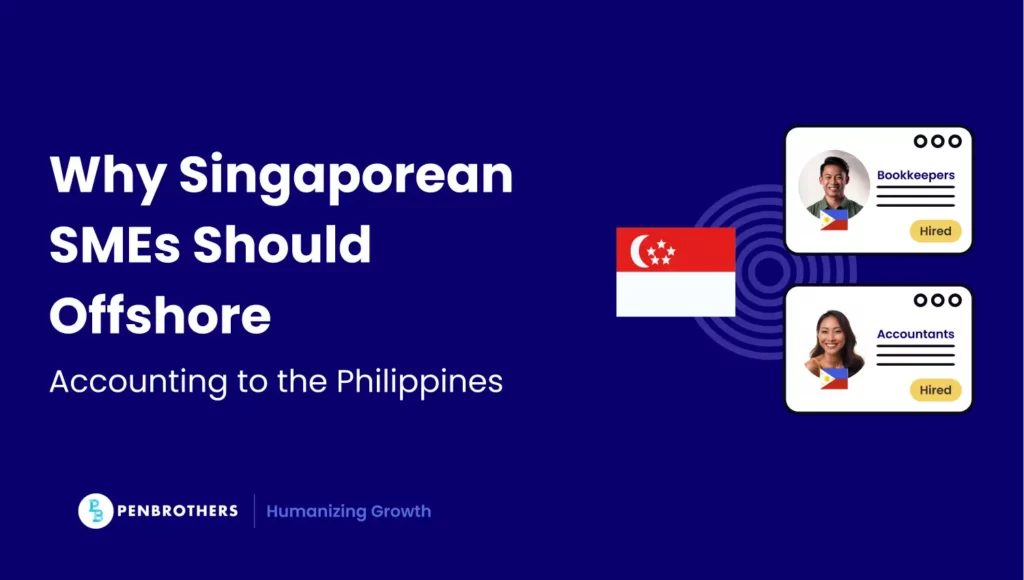Running a small to medium-sized enterprise (SME) in Singapore is not without its challenges, especially when it comes to managing accounting tasks.
The constant need to balance quality with affordability, combined with the rising costs of skilled labor, makes effective financial management a complex and often costly endeavor.
Offshore accounting presents an attractive solution, allowing businesses to reduce costs without compromising on quality. And when it comes to offshore destinations, the Philippines is quickly becoming a top choice for Singaporean SMEs.
Related: HR Outsourcing Singapore: Scale Faster With Payroll, Compliance, and HR Advisory
Key Takeaways
- Massive Cost Savings: Singaporean SMEs can reduce their accounting costs by 50-70% by offshoring to the Philippines. For example, a bookkeeper who costs $3,000–$5,000/month in Singapore can be hired for just $1,200–$1,700/month.
- Access to High-Quality Talent: The Philippines has a deep pool of skilled, English-speaking accounting professionals who are proficient in international standards (IFRS) and popular accounting platforms like Xero and QuickBooks.
- Increased Efficiency and Strategic Focus: By outsourcing routine tasks like bookkeeping, payroll, and tax prep, your local Singaporean team is free to concentrate on high-value strategic work, which improves decision-making and drives business growth.
- Seamless Integration and Communication: The negligible time difference between Singapore and the Philippines allows for real-time collaboration during standard business hours. High English proficiency and a strong outsourcing infrastructure minimize communication barriers.
The Benefits of Offshore Accounting for SMEs
Offshore accounting offers a range of benefits for SMEs in Singapore, providing an immediate competitive edge. The primary advantage is cost savings. By outsourcing accounting tasks to countries with lower labor costs, such as the Philippines, SMEs can significantly reduce expenses. Hiring locally in Singapore for accounting services can be expensive, particularly for businesses with limited financial resources. Offshore staffing helps lower these costs while maintaining high standards of quality.
Here is a breakdown of the typical monthly salary ranges for key accounting roles in the Philippines, according to the 2025 Penbrothers Salary Guide. These figures give you a clear and accurate view of the potential savings:
Bookkeepers: $1,200 – $1,700
- (PHP 70,500 – PHP 99,900)
- (SGD 1,600 – SGD 2,300)
Payroll Analyst / Specialist: $900 – $1,200
- (PHP 52,900 – PHP 70,500)
- (SGD 1,200 – SGD 1,600)
Accounts Payable / Receivable Specialist: $1,200 – $1,600
- (PHP 70,500 – PHP 94,000)
- (SGD 1,600 – SGD 2,150)
Financial Analyst: $1,300 – $1,900
- (PHP 76,400 – PHP 111,600)
- (SGD 1,750 – SGD 2,550)
Tax Analyst: $1,300 – $1,700
- (PHP 76,400 – PHP 99,900)
- (SGD 1,750 – SGD 2,300)
Beyond cost savings, offshore accounting gives SMEs access to a highly skilled pool of professionals.
The Philippines is known for producing competent accountants who are well-versed in international accounting standards. These professionals bring a level of expertise that can help businesses streamline financial processes, reduce errors, and ensure compliance with local and international regulations.
Efficiency also improves with offshore accounting. Outsourcing routine tasks such as bookkeeping, payroll, and tax preparation allows internal teams to focus on higher-value work. The increased operational efficiency means quicker financial reporting, improved cash flow management, and enhanced strategic decision-making.
Key benefits of offshore accounting for SMEs:
- Cost savings without compromising quality
- Access to a skilled accounting workforce
- Increased efficiency in financial operations
- Focus on core business activities while leaving routine tasks to experts
How Much Does an Offshore Bookkeeper Cost?
When hiring a full-time, experienced bookkeeper in the Philippines, you can expect a monthly salary range of $1,200–$1,700. This translates to a highly competitive hourly rate of approximately $7 to $10.
Let’s put those numbers into perspective for Singapore-based companies. Hiring a local bookkeeper typically costs between $3,000 and $5,000 a month. By offshoring this role to the Philippines, you can access the same high-quality talent for 50-65% less. This aligns with the average salary savings of 70% that companies can achieve by building remote teams. One of our clients, an SME in Singapore, successfully reduced their accounting costs from $8,000 to $2,400 monthly while simultaneously improving their reporting speed.
For the monthly salary of $1,200–$1,700, you are not hiring an entry-level professional. You are securing an experienced bookkeeper capable of managing the full accounting cycle. Their responsibilities typically include:
- Handling day-to-day data entry, invoice processing, and bank reconciliations.
- Generating key financial statements and reports.
- Managing complex and multi-currency operations for multiple entities.
The value extends beyond cost savings. Philippine accounting professionals are proficient in global accounting platforms like Xero and QuickBooks. Furthermore, because the Philippines shares the same time zone as Singapore, your offshore team operates in perfect sync with your local business hours. Reputable outsourcing partners also ensure their teams are fully trained on market-specific regulations, including Singapore’s GST requirements.
Why Choose the Philippines?
When considering offshore accounting, Singaporean SMEs have a range of options. But the Philippines stands out as an ideal destination for several compelling reasons.
1. Highly Skilled, English-Speaking Workforce
The Philippines boasts a workforce that is not only skilled but also fluent in English. This is especially important for Singaporean SMEs that need clear and effective communication with their offshore team. Philippine universities produce thousands of accounting graduates each year, ensuring a steady pipeline of talent ready to meet the needs of global businesses.
2. Affordable Labor Costs
The cost of living in the Philippines is significantly lower than in Singapore. As a result, labor costs are more affordable, enabling Singaporean businesses to tap into high-quality services at a fraction of the cost they would incur locally. Offshore staffing solutions allow SMEs to enjoy significant savings without sacrificing the quality of their financial management.
3. Strong Outsourcing Infrastructure
The Philippines has a well-established outsourcing industry. From robust IT systems to a culture that embraces service excellence, the country is well-equipped to handle the needs of international businesses. This infrastructure ensures smooth transitions, minimal disruption, and high productivity for companies engaging in offshore accounting.
4. Time Zone Alignment
The time difference between Singapore and the Philippines is negligible, with only a one-hour difference. This allows for seamless communication and collaboration between local and offshore teams. Singaporean SMEs can easily coordinate with their offshore accounting teams during regular business hours, ensuring that urgent matters are addressed promptly.
5. Proven Track Record
The Philippines has already established itself as a reliable destination for outsourcing services. Many global companies, including major financial institutions, have successfully outsourced key operations to the Philippines, benefiting from both the talent and the cost savings available. Singaporean SMEs can feel confident knowing they are partnering with a country that has a proven track record in delivering quality offshore services.
Key reasons to choose the Philippines:
- Skilled English-speaking professionals
- Cost-effective accounting services
- Established outsourcing infrastructure
- Time zone convenience for Singapore
- Proven history of successful outsourcing partnerships
Addressing Concerns
While offshore accounting offers numerous benefits, it’s natural for Singaporean SMEs to have concerns about this approach. However, these concerns can be addressed with the right strategies and partners in place.
1. Data Security and Confidentiality
One of the most common concerns is data security, particularly when sensitive financial information is involved. To mitigate these risks, it is essential to partner with a reputable offshore provider that follows strict data protection protocols. Offshore staffing companies like Penbrothers ensure compliance with international data privacy laws and implement advanced security measures to safeguard your financial information.
2. Legal and Regulatory Compliance
Another concern is whether offshore teams can comply with Singapore’s legal and financial regulations. Fortunately, accountants in the Philippines are well-versed in international standards, including IFRS (International Financial Reporting Standards). Reputable outsourcing firms ensure that their staff are continually trained in both local and global regulations, ensuring that your business remains compliant at all times.
3. Communication Barriers
Effective communication is key to successful outsourcing. While language barriers are a concern for some, this is largely mitigated by the strong English proficiency in the Philippines. Many offshore teams are experienced in working with global clients and are trained to communicate effectively through digital platforms, emails, and regular reporting, ensuring smooth and seamless collaboration.
Solutions to common concerns:
- Choose a provider with stringent data protection measures
- Ensure your offshore team is trained in Singapore’s regulatory framework
- Leverage communication technologies for effective collaboration
How to Get Started
Transitioning to offshore accounting doesn’t have to be complicated. Follow these steps to ensure a smooth and successful process:
1. Identify Your Needs
Start by assessing your company’s current accounting processes and identifying the specific tasks that can be outsourced. Whether it’s payroll management, tax filing, or bookkeeping, understanding your needs will help you choose the right offshore provider.
2. Choose the Right Outsourcing Partner
The success of your offshore accounting operations depends largely on your choice of partner. Look for a firm that has a strong track record in the Philippines, offers tailored solutions, and understands the unique needs of Singaporean SMEs. A provider like Penbrothers offers personalized services, ensuring a good fit for your business.
3. Start Small
If you’re new to outsourcing, it can be helpful to start with a small portion of your accounting tasks. This allows you to test the waters, get comfortable with the offshore team, and refine your processes before scaling up.
4. Establish Clear Communication Channels
Successful offshore accounting depends on clear communication. Set expectations early, establish reporting protocols, and use communication tools that allow for seamless collaboration across borders.
Steps to begin with offshore accounting
- Assess your accounting needs and prioritize tasks to outsource
- Select a reputable offshore provider with expertise in your industry
- Start small, then scale as you gain confidence
- Ensure open and regular communication with your offshore team
Conclusion: Unlocking the Power of Offshore Accounting
As Singaporean SMEs look for ways to optimize their financial operations while keeping costs in check, offshore accounting in the Philippines presents a strategic opportunity. The cost savings, access to skilled professionals, and operational efficiencies gained through offshore staffing can make a significant impact on business growth. With the right partner, SMEs can address potential concerns about security, compliance, and communication, making offshore accounting a viable and attractive option.
Are you ready to take the next step? Contact Penbrothers today to explore customized offshore staffing solutions that will streamline your accounting processes and allow you to focus on growing your business. Let us help you unlock the power of offshore accounting and position your company for long-term success.
Frequently Asked Questions
You can expect to save 50-70% on salary costs. The article compares hiring a local bookkeeper in Singapore for $3,000–$5,000 per month to hiring an experienced offshore bookkeeper in the Philippines for $1,200–$1,700 per month. One client case study showed a reduction in monthly accounting costs from $8,000 down to $2,400.
The Philippines is an ideal choice for Singaporean SMEs for several key reasons:
Highly Skilled Workforce: A large pool of qualified, English-speaking accountants.
Time Zone Alignment: The time difference is negligible, making real-time communication easy.
Proven Infrastructure: A well-established outsourcing industry ensures reliability and professionalism.
Cost-Effectiveness: Significantly lower labor costs without sacrificing quality.
Yes. Reputable offshore providers ensure their teams are thoroughly trained on Singapore’s specific regulatory framework, including requirements like GST. Additionally, Filipino accountants are generally well-versed in International Financial Reporting Standards (IFRS), which provides a strong foundation for compliance.
Data security is a primary concern that established offshore partners take very seriously. You should choose a provider, like Penbrothers mentioned in the article, that has strict data protection protocols, complies with international data privacy laws, and uses advanced security measures to safeguard your company’s sensitive financial information.
The article recommends you start small. Begin by identifying a specific, manageable task to outsource, such as bookkeeping. This allows you to test the process, build a relationship with your offshore team, and refine your communication channels before scaling up to more complex accounting functions.






